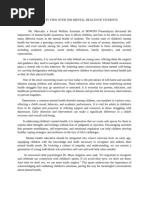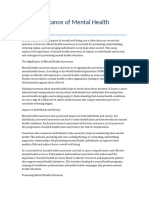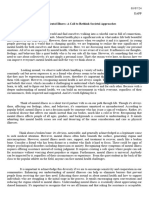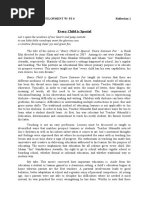0 ratings0% found this document useful (0 votes)
22 viewsEssay MUET
Essay MUET
Uploaded by
melvinh2017Copyright:
© All Rights Reserved
Available Formats
Download as PDF, TXT or read online from Scribd
Essay MUET
Essay MUET
Uploaded by
melvinh20170 ratings0% found this document useful (0 votes)
22 views2 pagesCopyright
© © All Rights Reserved
Available Formats
PDF, TXT or read online from Scribd
Share this document
Did you find this document useful?
Is this content inappropriate?
Copyright:
© All Rights Reserved
Available Formats
Download as PDF, TXT or read online from Scribd
Download as pdf or txt
0 ratings0% found this document useful (0 votes)
22 views2 pagesEssay MUET
Essay MUET
Uploaded by
melvinh2017Copyright:
© All Rights Reserved
Available Formats
Download as PDF, TXT or read online from Scribd
Download as pdf or txt
You are on page 1of 2
“An ounce of prevention is worth a pound of cure.
" This age-old
proverb could not be more relevant in today's fast-paced, high-stress world,
where mental health challenges are becoming increasingly common. With
the rise in anxiety, depression, and other mental health issues, it is clear
that education on mental health is not just beneficial but essential in the
21st century. In this context, teaching mental health awareness in schools
is crucial. I strongly believe that education on mental health is necessary in
the 21st century. It helps to break down stigmas, equips young individuals
with the knowledge to manage their mental well-being, and fosters a
supportive community. Education in mental health can lead to a more
informed, empathetic, and resilient generation, and is thus a fundamental
necessity for our times.
Teaching young people about mental health gives them the right
information and tools to understand these issues. When students know
about mental health conditions, their symptoms, and how to treat them, it
helps reduce misunderstandings. For example, …An informed generation
can spot early signs of mental health problems in themselves and others,
allowing for quick help. This approach also reduces the stigma around
mental health, making it easier to talk about and support each other.
Therefore, education on mental health to young generations provides them
the right information and awareness on these issues.
Learning about mental health helps young people become more
empathetic and understanding. When students know what it is like for
people with mental health conditions, they become more willing to help and
support them. This knowledge breaks down barriers and promotes
inclusivity, making sure everyone feels understood and valued. A society
built on empathy means that people are more likely to help each other,
creating a strong, supportive community.
Teaching mental health skills helps individuals manage stress, cope
with tough situations, and build resilience. Resilience means bouncing back
from difficulties and staying mentally healthy. By teaching students how to
cope with stress and build emotional strength, we prepare them to face
life's challenges with confidence. A resilient generation can handle the
complexities of modern life, stay positive, and contribute to a healthier
society.
In conclusion, teaching mental health education in schools is
essential because it creates an informed generation, fosters empathy and
understanding, and builds resilience. By providing young people with the
knowledge and skills to manage their mental health, we can reduce the
stigma around mental health issues, create a supportive community, and
prepare them to face life's challenges with confidence. This approach not
only benefits individuals but also contributes to a healthier, more
compassionate society.
You might also like
- Syllabus ED 103 Current Trends Issues and Problems in EducationDocument3 pagesSyllabus ED 103 Current Trends Issues and Problems in EducationElnestBantolo89% (19)
- DLL COT1 English 7Document2 pagesDLL COT1 English 7John Edmark Telesforo100% (4)
- Cervantes, Ralph Raymond G. (Persuasive Speech (PIECE) - SPEECH 1)Document8 pagesCervantes, Ralph Raymond G. (Persuasive Speech (PIECE) - SPEECH 1)Ralph Raymond CervantesNo ratings yet
- An Experts View Over The Mental Health of StudentsDocument2 pagesAn Experts View Over The Mental Health of Studentsmasgmarco1234No ratings yet
- Essay 20Document1 pageEssay 20laibakhanjan99No ratings yet
- Mental healthDocument1 pageMental healthnasrulnasria06No ratings yet
- The Importance of Mental Health AwarenessDocument3 pagesThe Importance of Mental Health AwarenessceliadessardNo ratings yet
- The Importance of Mental Health Awareness in Modern SocietyDocument2 pagesThe Importance of Mental Health Awareness in Modern SocietyMai Chí ThiệnNo ratings yet
- Education on mental health is necessary in the 21st centuryDocument2 pagesEducation on mental health is necessary in the 21st centurySyahir HakimiNo ratings yet
- Essay 1Document1 pageEssay 1laibakhanjan99No ratings yet
- - Báo động về sức khỏe tinh thần của giới trẻ - Mối quan tâm và giải pháp -Document3 pages- Báo động về sức khỏe tinh thần của giới trẻ - Mối quan tâm và giải pháp -trangvttss181007No ratings yet
- Inquiry Project ReportDocument3 pagesInquiry Project Reportapi-321379242No ratings yet
- ESSAY3Document3 pagesESSAY3LIZANo ratings yet
- TeenagepregDocument2 pagesTeenagepregAra Joy ArnanteNo ratings yet
- The Importance of Mental Health AwarenessDocument1 pageThe Importance of Mental Health Awarenesszaryabalikhan08No ratings yet
- The Importance of Mental Health Awareness in Modern SocietyDocument2 pagesThe Importance of Mental Health Awareness in Modern Societyvipaj57276No ratings yet
- Global IssueDocument3 pagesGlobal Issuesinghr91595No ratings yet
- The Importance of Mental Health AwarenessDocument2 pagesThe Importance of Mental Health AwarenessAmbrish UpadhyayNo ratings yet
- mental healthDocument1 pagemental healthlightningraio2004No ratings yet
- Public SpeakingDocument2 pagesPublic SpeakingRoger SalvadorNo ratings yet
- Mental HealthDocument3 pagesMental HealthhasanollenNo ratings yet
- ### The Significance of Mental HealDocument2 pages### The Significance of Mental Healjc1545313No ratings yet
- Document 3Document1 pageDocument 3aineeNo ratings yet
- ESAYDocument2 pagesESAYLIZANo ratings yet
- WELLNESSDocument4 pagesWELLNESSAyla GasiNo ratings yet
- MauricioDocument1 pageMauriciog7x9xrszccNo ratings yet
- The Importance of Mental Health Awareness in SocietyDocument3 pagesThe Importance of Mental Health Awareness in SocietyvvkchowdaryNo ratings yet
- Importance of Mental Health AwarenessDocument2 pagesImportance of Mental Health Awarenesslolix61821No ratings yet
- ManosamvadDocument4 pagesManosamvadShreya BajajNo ratings yet
- Pidato Bahasa InggrisDocument1 pagePidato Bahasa Inggrisyunitasyarif23No ratings yet
- Understanding And Supporting Mental Health Challenges In Children And AdolescentsFrom EverandUnderstanding And Supporting Mental Health Challenges In Children And AdolescentsNo ratings yet
- The Importance of Mental Health AwarenessDocument2 pagesThe Importance of Mental Health AwarenessКалоян ПенчевNo ratings yet
- Breaking The Silence: Saving Young Lives From Mental Health StrugglesFrom EverandBreaking The Silence: Saving Young Lives From Mental Health StrugglesNo ratings yet
- Posirion Paper Shiek AbdurahmanDocument3 pagesPosirion Paper Shiek AbdurahmanJuu RouNo ratings yet
- The Importance of Mental Health AwarenessDocument1 pageThe Importance of Mental Health AwarenessCarlosSa2008No ratings yet
- Sec AssignmentDocument2 pagesSec Assignmentshivmakwana0007No ratings yet
- Mental Health AwarenessDocument2 pagesMental Health AwarenessCassidyNo ratings yet
- ST Week 1-FabianoDocument3 pagesST Week 1-FabianoMARK LARRY FABIANONo ratings yet
- Why Is Mental Health Important To StudentsDocument1 pageWhy Is Mental Health Important To StudentsZane Rohann GammaruNo ratings yet
- marcuxDocument7 pagesmarcuxreyadvillarosa704No ratings yet
- Philosophy StatementDocument1 pagePhilosophy Statementapi-508760714No ratings yet
- Email Homework-Pamela ChunlloDocument1 pageEmail Homework-Pamela Chunllopamela chunlloNo ratings yet
- Minding Mental HealthDocument2 pagesMinding Mental Healthnicolecrystalpbriones56No ratings yet
- mental health essayDocument1 pagemental health essaybleachdrinker475No ratings yet
- Life Skill Education For Adolescents: Its Relevance and ImportanceDocument5 pagesLife Skill Education For Adolescents: Its Relevance and ImportancePranay PandeyNo ratings yet
- Document 2Document1 pageDocument 2odonzizaNo ratings yet
- The Importance of Mental Health AwarenessDocument1 pageThe Importance of Mental Health Awarenesslucia.gray.crimsonNo ratings yet
- eojfjireinrijgtniDocument2 pageseojfjireinrijgtnikolbe1walshNo ratings yet
- Naskah Pidato Mental Health Revisi 2Document3 pagesNaskah Pidato Mental Health Revisi 2Chia MokaNo ratings yet
- MypdfDocument7 pagesMypdfsimonevoicoviciNo ratings yet
- The Importance-WPS OfficeDocument1 pageThe Importance-WPS OfficetorrruizNo ratings yet
- How To Make A CakeDocument2 pagesHow To Make A CakeflorentinokobtmuaNo ratings yet
- Limbas Final EssayDocument2 pagesLimbas Final EssaykentjasperdanoNo ratings yet
- script-for-essaysDocument1 pagescript-for-essaysPriya singhNo ratings yet
- MemoDocument1 pageMemosharongidhi37No ratings yet
- The Importance of Mental Health Awareness in Modern Society - BY - EMRALD FREE STUDY MATERIALSDocument3 pagesThe Importance of Mental Health Awareness in Modern Society - BY - EMRALD FREE STUDY MATERIALSssimplelineinmindNo ratings yet
- UPLD - CGPT - The Importance of Mental Health AwarenessDocument1 pageUPLD - CGPT - The Importance of Mental Health AwarenessBeboy TorregosaNo ratings yet
- Mental Wellness on a Dime: Budget Friendly Strategies for HappinessFrom EverandMental Wellness on a Dime: Budget Friendly Strategies for HappinessNo ratings yet
- Mental Health Issues in Millennials GenerationDocument2 pagesMental Health Issues in Millennials GenerationretorianolloydNo ratings yet
- Mental Health AwarenessDocument2 pagesMental Health AwarenessEndaya Kristel D.No ratings yet
- Topic 5Document226 pagesTopic 5Kartik SinghNo ratings yet
- Student Learning Outcomes: Lesson 1Document3 pagesStudent Learning Outcomes: Lesson 1Charlynjoy AbañasNo ratings yet
- Module 4 - Assignment - Lesson Sharing: Preparation/PlanningDocument4 pagesModule 4 - Assignment - Lesson Sharing: Preparation/Planningapi-664817500No ratings yet
- 06 Handout 1Document3 pages06 Handout 1faye clarisse cadagNo ratings yet
- Sample DETAILED LESSON PLANDocument6 pagesSample DETAILED LESSON PLANmarkjosephcalipes15No ratings yet
- l2 Vocabulary Acquisition Through Extensive ReadingDocument13 pagesl2 Vocabulary Acquisition Through Extensive ReadingbalpomoreliNo ratings yet
- Undertake A Routine TaskDocument16 pagesUndertake A Routine Tasktereve100% (3)
- SIP - Phase 1 - ASSESSDocument12 pagesSIP - Phase 1 - ASSESSEdwin Siruno LopezNo ratings yet
- Activity Design 1 - Differentiated InstructionDocument2 pagesActivity Design 1 - Differentiated InstructionLuz Marie CorveraNo ratings yet
- Cept PresentationDocument38 pagesCept Presentationshaily068574No ratings yet
- 2 DRRR Week 5Document3 pages2 DRRR Week 5Mary Ann SabadoNo ratings yet
- Geography Lesson PlanDocument4 pagesGeography Lesson Planapi-204977805100% (3)
- Lesson Plan Template 01Document3 pagesLesson Plan Template 01jungle1000No ratings yet
- 1 Cekap RPH PBSDocument2 pages1 Cekap RPH PBSLIM KHEE LING MoeNo ratings yet
- Lesson Plan TestDocument8 pagesLesson Plan TestPaul HasasNo ratings yet
- Recognition Awards: Academic Excellence AwardDocument4 pagesRecognition Awards: Academic Excellence AwardSalandanan HeideNo ratings yet
- Accomplishment Report IN Understanding Culture Society and Politics (Ucsp) 2016-2017Document7 pagesAccomplishment Report IN Understanding Culture Society and Politics (Ucsp) 2016-2017karen a escobidoNo ratings yet
- Field Experience Log Shelly Carter 7460Document13 pagesField Experience Log Shelly Carter 7460api-554224524No ratings yet
- Context For Senior High School. Quezon City, QC: C&E Publishing, IncDocument2 pagesContext For Senior High School. Quezon City, QC: C&E Publishing, IncJheaNo ratings yet
- Limited Face To Face ChallengesDocument4 pagesLimited Face To Face ChallengesNorhaina SinsuatNo ratings yet
- Kryszewska 144607002Document7 pagesKryszewska 144607002Fernando Cifuentes PerezNo ratings yet
- Being A Good Teacher: Dr. T. Christopher, M.E., PH.DDocument22 pagesBeing A Good Teacher: Dr. T. Christopher, M.E., PH.DDr.T.ChristopherNo ratings yet
- In Practice. London: Bloomsbury: International Edutourism and Voluntourism. Who Really Benefits?Document5 pagesIn Practice. London: Bloomsbury: International Edutourism and Voluntourism. Who Really Benefits?Tony MahonNo ratings yet
- Rotational Hex Designs LessonDocument6 pagesRotational Hex Designs Lessonapi-373975702No ratings yet
- Supervisory Plan Sept. 2024Document5 pagesSupervisory Plan Sept. 2024zaldy mendozaNo ratings yet
- Positive Schooling and Positive ParentingDocument9 pagesPositive Schooling and Positive ParentingSahil AnsariNo ratings yet
- Y3 Autumn Math SOL Place ValueDocument56 pagesY3 Autumn Math SOL Place ValueSteven Hopkins100% (1)
- MODULE 8 - NEO B-WPS OfficeDocument36 pagesMODULE 8 - NEO B-WPS OfficeRhoanne SalesNo ratings yet
- Reflection 1. Every Child Is SpecialDocument2 pagesReflection 1. Every Child Is SpecialJoy ManliguezNo ratings yet

























































































